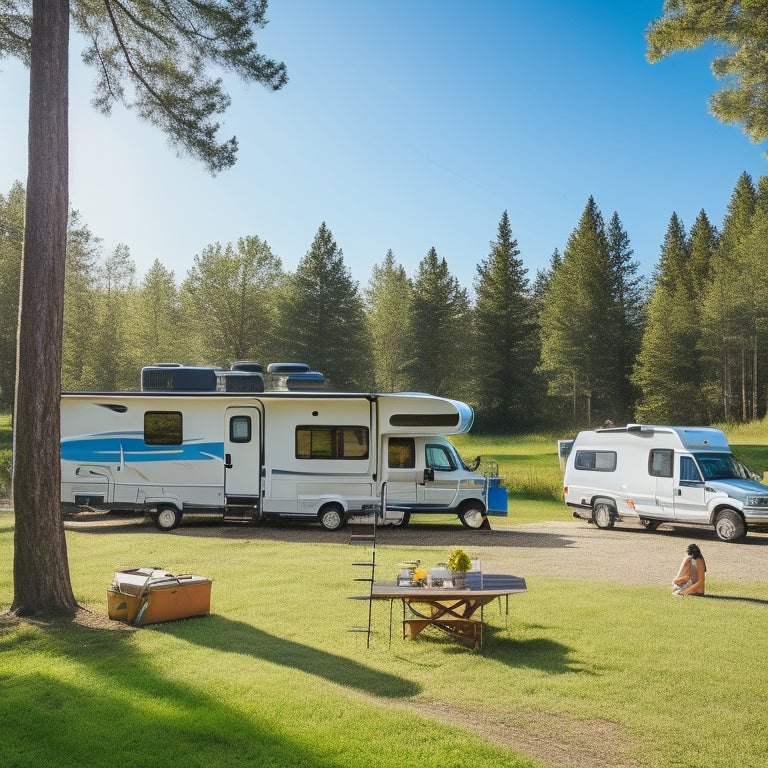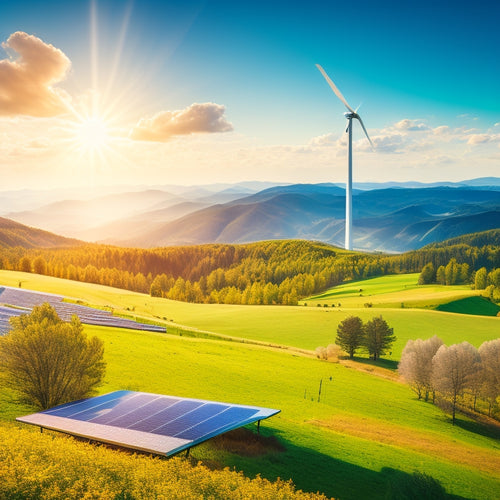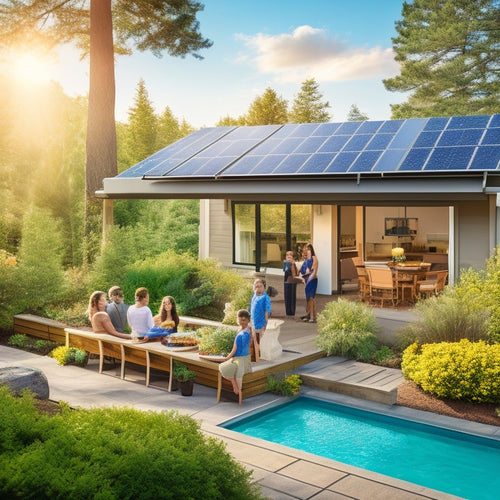
Installing Solar Panels on Your RV in 3 Simple Steps
Share
Installing solar panels on your RV is easy and can revolutionize your travels. First, assess your energy needs by calculating the wattage of your devices. This helps you choose the right solar panel type, whether monocrystalline for efficiency or flexible panels for fitting contours. Second, gather your installation materials, including mounting hardware and wiring. Finally, mount the panels securely, ensuring they're weather-resistant. This setup offers off-grid freedom, reduces energy costs, and elevates your RV's resale value. Uncover more about optimizing your solar energy system to enhance your travel escapades.
At a Glance
- Assess Power Needs: Calculate daily wattage requirements by listing devices and their usage to determine the ideal solar panel capacity for your RV.
- Choose Solar Panels: Select the right type of solar panels based on efficiency, space, and your energy needs, such as monocrystalline or flexible panels.
- Install Mounting System: Securely mount panels on your RV roof, ensuring they are oriented for optimal sunlight exposure and follow manufacturer guidelines.
- Connect Wiring: Wire the solar panels to a charge controller and battery system, ensuring proper connections to safely store energy for later use.
- Test and Monitor: After installation, test the system to ensure it functions correctly and monitor your energy production and consumption regularly.
Cost-Effective Energy Solution
Installing solar panels on your RV considerably reduces your energy bills, allowing you to spend less on utilities while maximizing your excursions.
With solar power, you gain increased off-grid freedom, enabling you to investigate remote locations without worrying about your energy supply.
Maximizing energy efficiency is key to ensuring your solar system works effectively, which can further enhance your savings.
Shifting to this renewable energy source not only saves you money but also enhances your overall travel experience.
Lower Energy Bills
Utilizing the power of solar energy not only enhances your RV experience but also greatly lowers energy bills, making it a cost-effective solution for travelers. By installing solar panels, you tap into a renewable energy source that drastically reduces your reliance on traditional power sources, leading to significant energy savings.
This shift allows you to enjoy the open road without constantly worrying about rising fuel or electric costs. Incorporating solar energy into your RV means you can free up your budget for other travel experiences.
With proper budget planning, the initial investment in solar panels quickly pays off as you cut down on monthly utility bills. The more you rely on solar power, the less you'll need to spend on campground hookups or generators, which can drain your finances.
Moreover, as you travel, having a solar setup means you can generate electricity wherever you go, limiting those unexpected costs associated with energy consumption.
With lower energy bills, you can allocate funds to investigate new destinations, indulge in local cuisine, or invest in recreational activities. Welcome the freedom of the road while enjoying the financial benefits of solar energy.
Increased Off-Grid Freedom
Freedom on the open road becomes a reality when you employ solar power for your RV. With solar panels, you gain the ability to capture the sun's energy, providing a cost-effective energy solution that enhances your freedom discovery. No longer will you be tethered to crowded campgrounds or limited by traditional power sources. Instead, you'll enjoy unparalleled travel flexibility, allowing you to journey off the beaten path.
Here's a quick overview of the benefits:
| Benefits | Details |
|---|---|
| Energy Independence | Generate your own power, reducing reliance on RV parks. |
| Cost Savings | Lower energy bills mean more funds for excursions. |
| Sustainable Travel | Reduce your carbon footprint while enjoying nature. |
Installing solar panels equips you with essential energy to power your appliances, devices, and lights, all while living a life of exploration. The initial investment pays off as you experience the freedom to roam wherever your heart desires. Adopt this off-grid lifestyle and change your RV into a self-sufficient powerhouse, freeing you to enjoy the great outdoors like never before.
Sustainable Power Source
Switching to solar panels on your RV greatly reduces your environmental footprint by utilizing clean, renewable energy.
Not only does this shift promote sustainability, but it also grants you energy independence, freeing you from reliance on fossil fuels and traditional power sources.
Environmental Impact Reduction
Installing solar panels on your RV can greatly reduce your environmental footprint by utilizing a clean and renewable energy source. By tapping into solar power, you'll considerably lower your carbon footprint, making your travels more sustainable. It's a step toward embracing renewable resources that not only benefits you but also the planet.
Here's a breakdown of the environmental impact of switching to solar energy:
| Aspect | Solar Panels |
|---|---|
| Carbon Emissions | 0 g CO2/kWh |
| Fossil Fuel Dependency | Reduced |
| Noise Pollution | Minimal to none |
| Energy Source Sustainability | Highly renewable |
Transitioning to solar panels means you're not just powering your RV; you're actively participating in the global movement towards sustainability. You'll be less reliant on traditional power sources, which often rely on fossil fuels that contribute to climate change. Plus, you'll enjoy the freedom to camp off-grid without worrying about power sources.
Energy Independence Benefits
Adopting solar panels for your RV offers significant energy independence, allowing you to generate your own power wherever your travels take you. This energy autonomy not only liberates you from dependency on campgrounds and traditional power sources but also enables you to discover off-the-beaten-path locations.
With solar panels, you can utilize the sun's energy, ensuring that your journeys aren't limited by accessibility to electricity. The self-sufficiency advantages are undeniable. You'll enjoy the freedom to stay longer in remote areas without worrying about draining your batteries.
Plus, you'll reduce your overall energy costs, as sunlight is free and abundant. Imagine waking up in a secluded spot, with your appliances running smoothly, all thanks to your solar setup. It's not just about convenience; it's about creating a lifestyle that prioritizes independence.
Moreover, solar panels enhance your RV's resale value by making it an attractive option for future buyers seeking sustainable solutions. By investing in solar energy, you're not just upgrading your RV; you're investing in a sustainable future and enjoying the freedom to roam without limits.
Take control of your energy needs and seize the journey that lies ahead!
Panel Efficiency Ratings
When you're choosing solar panels for your RV, understanding efficiency ratings is essential for maximizing your energy output.
High efficiency ratings (20-22%) can greatly enhance energy production, especially in limited roof space.
Different types of solar panels come with varying efficiency levels, affecting how much sunlight they can convert into usable power.
Understanding Efficiency Ratings
Understanding efficiency ratings is vital for anyone looking to maximize solar power on their RV. Higher efficiency ratings mean you can generate more electricity with less space, which is significant when you're living on the road. When you compare different solar panel technologies, efficiency becomes a key factor in your decision-making process.
Here's a quick efficiency comparison of common solar panel types:
| Solar Panel Type | Efficiency Rating (%) |
|---|---|
| Monocrystalline | 15-22% |
| Polycrystalline | 13-16% |
| Thin-Film | 10-12% |
| Bifacial | 20-28% |
| PERC | 18-23% |
When you're evaluating your options, keep in mind that higher efficiency panels often come with a higher price tag. However, the investment pays off regarding space savings and increased power output. If you're ready to welcome the freedom of RV life, understanding these efficiency ratings will help you choose the right solar panels, ensuring you have the energy you need wherever the road takes you.
Types of Solar Panels
Choosing the right type of solar panel for your RV can greatly impact your energy efficiency and overall experience on the road.
You've got several options to evaluate, each with unique benefits customized to your journey style.
Monocrystalline panels are known for their high efficiency and sleek design, making them ideal if you're tight on space but still want maximum power output.
On the other hand, polycrystalline panels are typically more affordable and perform well in moderate conditions, though they may take up more room compared to their monocrystalline counterparts.
If you're looking for versatility, thin film panels offer a lightweight alternative, but they generally have lower efficiency.
For those who need flexible options, flexible solar panels can easily conform to your RV's contours, providing a practical solution for various surfaces.
Lastly, portable solar panels are perfect for freedom seekers who want the flexibility of moving their power source based on their location.
No matter which type you choose, understanding these options will help you optimize your energy use and enhance your RV lifestyle.
Selecting Based on Wattage Requirements
To effectively select solar panels for your RV, you need to assess your power needs first.
Calculate the ideal wattage based on your appliances and energy usage to guarantee you have enough capacity to cover your requirements. This careful evaluation will help you make an informed decision that maximizes your solar investment.
Additionally, consider your desired battery capacity to guarantee it can support your energy needs during low sunlight or at night, which is essential for a reliable setup.
Assessing Power Needs
As you plan to install solar panels on your RV, evaluating your power needs is essential for selecting the right system.
Start with an energy assessment that outlines your daily power consumption. List all devices you'll be using, like lights, refrigerators, and electronics, and determine their wattage. This step helps you understand how much energy you'll need while enjoying the freedom of the open road.
Consider how often you'll use each device and how long they run daily. For instance, if you rely on a laptop for work or a fridge for food, knowing their power consumption will guide your solar panel selection.
Calculating Ideal Wattage
Determining the ideal wattage for your RV solar panel system is essential to confirm you have enough power for your needs. Start with a thorough wattage calculation based on your energy consumption.
List all the devices you plan to power, noting their wattage ratings and how many hours you'll use them daily. For instance, if you have a 60-watt laptop you use for 5 hours, that's 300 watt-hours (60 watts x 5 hours).
Next, sum up the watt-hours for all devices. This total gives you a clear illustration of your daily energy needs. To confirm you have enough solar power, consider adding a buffer—typically 20%—to account for inefficiencies and cloudy days.
Once you know your total wattage requirement, you can choose solar panels accordingly. For example, if your total daily consumption is 1,200 watt-hours, you'll need a system capable of generating that amount or more, factoring in solar hours available in your area.
Longer Lifespan Than Generators
When you choose solar panels for your RV, you're investing in a system that outlasts traditional generators.
Solar panels require minimal maintenance and are built to endure harsh conditions, leading to a considerably longer lifespan.
This durability not only saves you money in the long run but also provides reliable power for your excursions.
Durability and Maintenance Benefits
Solar panels offer a strong solution for RV power needs, outlasting traditional generators by years. When you switch to solar, you're investing in a durable energy source that requires minimal upkeep.
Unlike generators, which can break down or require frequent repairs, solar systems are designed to withstand harsh weather conditions, ensuring reliable energy wherever your travels take you.
To maximize the lifespan of your solar panels, focus on proper installation and maintenance practices. Use installation tips like securing panels with high-quality mounts and ensuring ideal angle alignment for sun exposure.
Regularly check your system for dirt or debris that can obstruct sunlight. A quick wash with water and a soft cloth can enhance efficiency.
Moreover, solar panels don't have moving parts that can wear out, which means less hassle for you.
You'll also enjoy the freedom to camp off-grid without the noise or exhaust of generators, allowing you to connect more deeply with nature.
With the right care, your solar investment will pay off, enabling your journeys for years to come. Accept the durability of solar and enjoy the maintenance benefits it brings to your RV lifestyle.
Frequently Asked Questions
Can I Install Solar Panels Myself, or Hire a Professional?
You can definitely handle DIY installation if you're handy and research thoroughly. However, hiring professional services guarantees knowledge and safety. Weigh your skills against your desires for freedom and peace of mind before deciding.
What Tools Will I Need for the Installation?
When it comes to installation tools, you'll need a drill, wire cutters, and connectors. Don't forget your wiring essentials, like fuses and cables, to guarantee everything runs smoothly. You're on the path to freedom!
How Do I Maintain My Solar Panels?
To maintain your solar panels, clean them regularly to remove dirt and debris. Aim for maintenance every few months, especially after storms. Keeping them in top shape maximizes efficiency and guarantees your freedom on the road.
What Happens if It Rains or Snows?
When it rains or snows, your solar panel efficiency can drop due to weather impact. However, don't worry; panels often self-clean and can still generate power, ensuring you maintain your freedom on the road.
Can Solar Panels Charge My RV Battery While Driving?
Yes, solar panels can charge your RV battery while driving, especially with high-efficiency panels. Employ monocrystalline or polycrystalline types for peak charging efficiency, ensuring you maximize energy production during your travels and enjoy true freedom on the road.
Explore More
By installing solar panels on your RV, you're not just investing in a cost-effective energy solution; you're utilizing the sun's boundless power to fuel your excursions. With careful selection of wattage and efficiency ratings, you'll enjoy a sustainable source of energy that outlasts traditional generators. This upgrade alters your RV into a mobile sanctuary of comfort and freedom. So, take the plunge—let the sun light your way, and welcome the open road with confidence!
Related Posts
-

Renewable Energy Solutions to Reduce Your Carbon Footprint
To reduce your carbon footprint, adopting renewable energy solutions is key. Using solar panels or wind turbines can ...
-

Top-Rated Home Solar Power Kits for Achieving Energy Independence
Top-rated home solar power kits enable you to achieve energy independence by greatly cutting your energy costs. You c...
-

Designing a Green Roof for Maximum Energy Efficiency
Designing a green roof for maximum energy efficiency involves several key strategies. Start by selecting native, drou...


